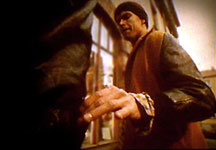How to Most Effectively Prevent Purse Snatching, Pickpocketing and Other Personal Thefts
by www.SixWise.com
In 2003, there were over 182,000 completed or attempted incidents
of purse snatching or pickpocketing in the United States,
according to the Bureau of Justice Statistics. And while it's
true that senior citizens are often easy targets, they are
-- by far -- not the only victims.
"A good pickpocket from a distance can tell who has
money," says pickpocket expert Bob Arno.
And money is usually what these petty thieves are after.
Contrary to popular belief, your purse or wallet is most likely
to be stolen in a crowded spot, not while you are walking
or shopping alone.
|

Acting confident can keep you from becoming a pickpocket's
target.
|
"If you are out there, as a single person walking around,
you are not going to become a target. That's very unlikely--unless
the thief is targeting you," Arno says.
How NOT to Appeal to a Pickpocket or Purse Snatcher
Pickpockets choose their targets carefully. They avoid people
who look confident and aware of their surroundings, and hone
in on those who seem more oblivious, lost or distracted in
some way.
As Arno said, "They [Pickpockets] have no respect, because
they feel they recognize you before you recognize them."
To reduce the odds that a pickpocket or purse snatcher will
target you, the first and most important rule is to be aware
of your surroundings. Then:
-
Watch out for potential "set-ups," such as
someone bumping into you or asking a question as a distraction
while someone else steals your wallet.
-
Appear confident and look like you know where you're
going. Says security expert Bruce Schneier, "People
who are targeted for street crimes look like victims."
-
Dress down. Don't flaunt jewelry or designer labels that
let a pickpocket know you're likely to have money or valuables
close at hand.
-
Listen to your instincts. If something feels strange,
go inside a store, cross the street or seek help.
Carrying Your Valuables Safely
Aside from how you look and act, the way you hold your purse
or wallet can also be a deciding factor on whether or not
you're preyed upon. Most thieves will go for the easiest target,
which means that if your purse is left unattended in a shopping
cart or your wallet is sticking out of your pocket, you're
more at risk.
|

Pickpockets and purse snatchers love big crowds.
|
"Bad guys are looking for easy options. The idea is
to make it difficult for them," says security consultant
and former member of SAS, Britain's elite special forces,
Nick Cameron. To make your purse and wallet less tempting
(and more difficult to snatch):
-
Keep your purse in sight at all times. Do not hang it
on the back of a chair, the hook on a public washroom
door, or leave it unattended while shopping or trying
on shoes.
-
Use a wallet that can attach to your belt (also known
as a money belt) and keep it out of sight.
-
Always keep purses closed and carry them close to the
front of your body, or held tightly under your arm.
-
If your purse is slung over your head, consider wearing
it under your coat (this makes it harder for a thief to
yank on the strap).
You can also protect yourself in advance. In the event your
purse or wallet is stolen, the impact will be less severe
if you:
-
Don't carry all your cash in one place.
-
Carry only a small amount of cash.
-
Don't keep your social security number in your wallet--it
puts you at risk of identity theft.
-
Carry only what's necessary, and nothing more.
-
Keep house keys in your pocket, rather than your purse.
If a thief steals your purse and house keys, they have
your address and access to your home.
-
Leave irreplaceable items (photos, important papers,
sentimental trinkets) at home.
What to do if Your Purse or Wallet is Stolen
Sometimes, no matter how careful you are, you can't stop
a pickpocket. The first thing to remember is that your purse
or wallet is not worth getting hurt over. If someone tries
to take your belongings, resist the urge to fight back. While
some thieves will back down at the sign of confrontation,
others are willing to fight and may be carrying a weapon.
Your safety is what's most important, and while your purse/wallet
can be replaced, your life cannot. Here's what to do immediately
after your purse or wallet is stolen:
-
Don't panic--try to think clearly.
-
Call the local police department right away.
-
Make a list of everything in your purse or wallet, including
credit cards, checks, ID cards, cash and other items.
-
Call your credit card companies and report your cards
as stolen.
-
Call your bank and tell them your bank cards/checks have
been stolen.
-
If your driver's license was stolen, contact your local
Driver's License Bureau to get a new one.
-
If your social security card was stolen, contact your
local Social Security office to get a new one (the number
won't be changed unless fraudulent activity is found).
-
Monitor your bills for unusual activity, and report anything
strange to the police.
Keep in mind, too, that purses and wallets are not the only
things that get stolen. With all of the new high-tech gadgets
out there, thieves have a whole new world of possibilities.
In fact, iPods and cell phones have been linked to an increase
in subway and bus-stop crimes in New York City.
"IPods have made bus stops a choice location for purse
snatching," said one police source. Luggage, leather
jackets, gold chains and expensive sneakers are also tempting
to thieves.
You don't need to walk around in fear, though. Just pay attention
to what's going on around you and use common sense about displaying
valuable items and pickpockets are likely to stay away.
Recommended Reading
The
Top Seven Signs that Someone is Lying to You
How Burglars
Target Which Homes to Rob, and How to Keep Yours Off Their
Hit Lists!
Sources
Seattle
Police Department
USA
Today: How to Avoid Pickpockets and Other Horror Stories
Prairie
Village Police Department
New
York Daily News
CBS
News: The Art of Picking Pockets